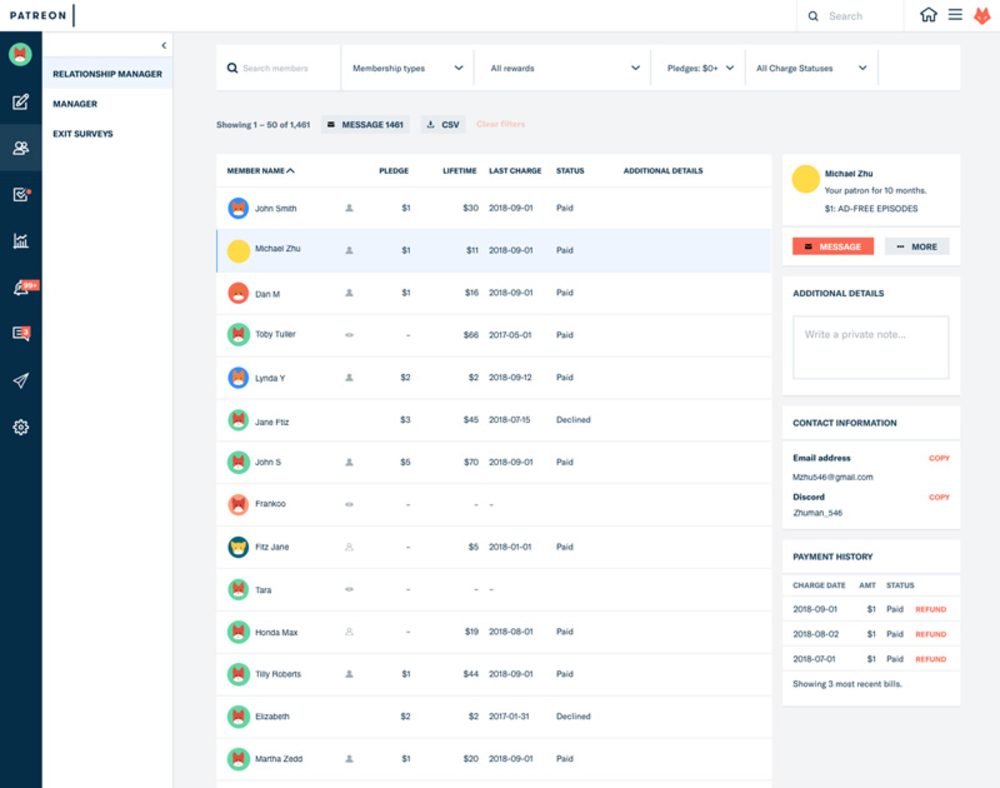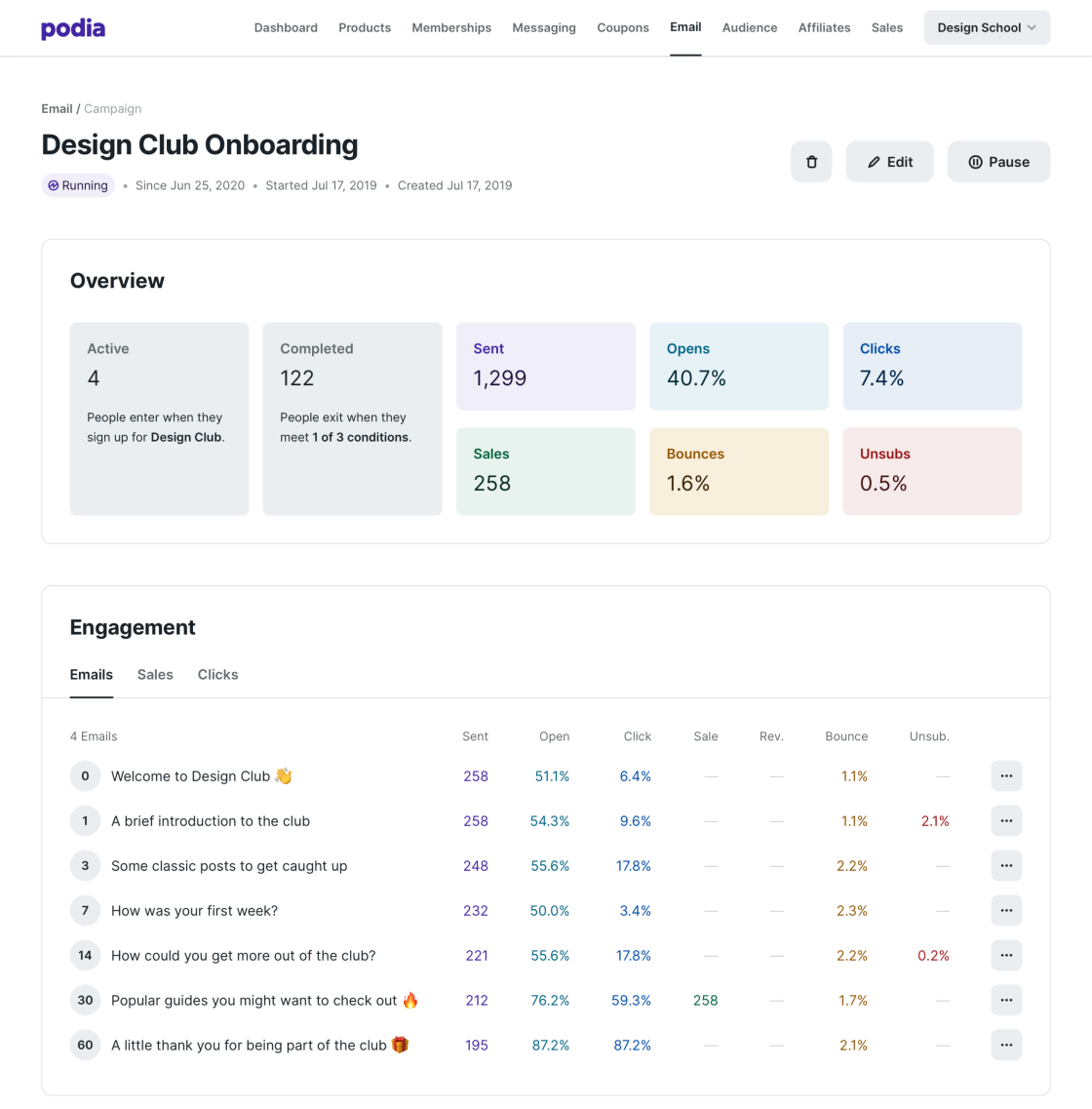Previously, in order to raise sufficient funds for your project or business, the only way is to go about pitching your product to potential investors, venture capitalists, or supporters.
The emergence of crowdfunding portals has altered the whole situation. These online platforms allow you to pitch your product or concept to the entire internet and bring your idea into reality. Patreon and Podia are striking examples in this arena.
In this article, I would like to compare the two platforms in the following angles:
- Raising Funds: A Big Funding Pot vs. Recurring Donations
- Revenue sharing: 5-12% Cut off vs Flat Monthly Fee
- Payment Schedule and Methods: Regular Monthly Payout vs Customised Payout Schedule
- Highlighted Tools and Features: All-rounded Tools vs Simple Website
- Freedom of Content Delivery: Generally Liberal vs Nearly Zero Limit
| Patreon | Podia | |
| Raising fund | Monthly subscription-based | Either subscription or one-off transaction |
| Revenue sharing | 5-12% Cut off on overall donations |
Flat Monthly Fee
|
| Payment schedule and methods |
|
|
| Highlighted tools and features |
|
|
| Freedom of content delivery | Generally liberal (e.g. nudity is allowed as long as flagged) | Nearly zero limits (e.g. nudity including porn is allowed) |
1. Raising Funds: A Big Funding Pot vs. Recurring Donations
Although Patreon and Podia are all both paid membership platforms, there are great differences in their funding models. Before you make you final choice, you should be thinking about the kind of business models you are opting for, which can be closely related to your frequency of posting and styles of creation.
Patreon: Subscription-based Platform and Ongoing Support
For Patreon, supporters, usually named Patrons, pledge a monthly fee to view the content you have created. As a creator, you can therefore generate a recurring, periodic supply of funds. Yet, the flip side is that rarely strangers are willing to pay any money for your Patreon project. Put it simply, the platform is more suitable for well-established creators opting for ongoing nature of support.
Podia: Monthly-subscription or One-off Transactions
The greatest difference between Podia and the other platforms is that it offers more flexibility. After setting up your membership, you can create content sign up for access to it in exchange for a monthly subscription. Alternatively, you can also sell online courses, digital downloads, and webinars on a one-off basis. Therefore, if you do have a one-time, well-designed project to be put onto the market, then Podia would be a better fit than Patreon.
2. Revenue sharing: 5-12% Cut off vs Flat Monthly Fee
For both platforms, it is completely free to start off an account. However, while Patreon takes up a certain percentage of monthly income creators earn, Podia requires a fixed monthly fee.
| Patreon | Podia | |
| Platform fee |
|
|
| Payment processing fees |
For more information, you can refer to the official website. |
Charged to subscribers/buyers
For more information, you can refer to the official website. |
3. Payment Schedule and Methods: Regular Monthly Payout vs Customised Payout
| Patreon | Podia | |
| Payment schedule |
Regular monthly payout
|
Depends on creators Creators can click on “One-time or monthly payment plans” and set up the value and number of installments. |
| Payment methods |
|
|
4. Highlighted tools and features: All-rounded tools vs simple website set-up
Patreon: Well-established Supporting Tools and Integration
Creators with a Patreon account can gain insight into and manage their campaign from a single dashboard. Data provided is linked to Google Analytics, so you can even see info on where your new patrons are coming from. The public-facing page has a place for your campaign description, reward tiers, private or public posts, and community interactions.

Discord integration is another highlighted feature of Patreon. Many creators discover that their fans/followers like gathering on a common platform to share ideas, hang out, and encourage one another. With Patreon's Discord integration, you can provide reward tiers access to a private Discord server. For example, at the $3/mo and higher level, you might offer access to all patrons.

Podia: Simple Website Builder, Email Marketing, Free Migration from Patreon website
Through Podia, you can sell a variety of online courses that fit your business and customers’ needs.
Without having to pay extra or figure out how to "make it talk" to your digital product platform, Podia allows you access to an email marketing platform: Send mass emails, create automatic email funnels, and track the exact ROI of every email you send with sophisticated email analytics, which is somewhat similar to the dashboard hosted by Patreon and Kickstarter.

Example of Podia email marketing
One worth-noting point is that Podia also includes data migration at no additional cost. Your existing content will be moved from wherever it is now hosted by the company. All you need to do is sign up for an annual plan.
Learn more: Free migration from other platforms to Podia
5. Freedom of content delivery: Generally liberal vs nearly zero limit
Unlike traditional content platforms like Youtube which contains stricter content guidelines and policy, creators usually enjoy more freedom on paid membership platforms. Yet, there are still restrictions in terms of content delivery on these platforms.
Patreon: Generally Liberal
For Patreon, creators basically enjoy a great extent of freedom.
|
Allowed
|
|
Not allowed
Learn more: https://www.patreon.com/policy/guidelines |
Podia: Nearly Zero Restrictions
One of the selling points of Podia is that there are zero limits on content. Their policy is to allow basically all content on Podia, with a minimal set of restrictions necessary to keep their customers safe.
|
Allowed
|
|
Not allowed
Learn more: https://www.Podia.com/features/sell-online-courses |
Key takeaways
| Patreon | Podia | |
| Pros |
|
|
| Cons |
|
|
Ultimately, it sounds cliche but there are no clear winners. Each platform had their highlights that cater different groups of users. You should always bear in mind that these platforms are often used in conjunction with one another. For example, many Youtubers will stream on Twitch or use Patreon for exclusive content.
Patreon might be a viable option if you are already famous and/ or otherwise inaccessible creatives with fan bases who are willing to pay to fund your personal projects, or your content in which they are interested in.
Nevertheless, Podia seems to me a good alternative to Patreon. The main selling point is Podia charges a flat monthly fee instead of cutting off the donations your supporters make. Therefore, if you are an established creator who draws a significant monthly income from selling your work, Podia may be more cost-effective. On the contrary, smaller creators looking for a more seller-friendly platform on which to start up their business, Podia's relatively high and fixed monthly cost might be a discouraging factor.
---
Ever thought of building your own website with Patreon features?
If you need your first 10 supporters, it's wise to get listed on big platforms like Patreon.
But if you already had a group of supporters or fans and would like to build your own website with Patreon features like charging subscription fee by tiers and publishing member-only content, you can consider using our product RakoSell as well.
RakoSell is a commission free tool that allows you to sell memberships by tiers and sell digital products in one-off basis, with identity tracking watermark feature to prevent viewers from leaking your content.
Start your free trial here now, no credit card required!

